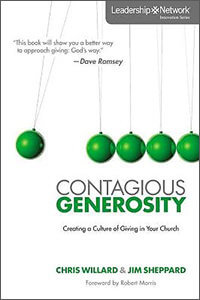Chris Willard and Jim Sheppard, authors of Contagious Generosity, explain the importance of developing a system to thank givers to celebrate their spiritual growth through giving and encourage greater generosity.
It is sad but true that many churches take their givers for granted. Most nonprofits, on the other hand, understand just how difficult it is to find prospects, cultivate them, and see them become givers. They take great pains to identify these people, to build relationships, and to maintain those relationships. Frequently, churches expect that people simply will give and that it is not the responsibly of the church to acknowledge or express appreciation for the gift. Not only is this just plain rude to the givers, it may lead the church to feel entitled to the monetary gifts. This can grow into an unhealthy attitude that turns off generous individuals and families. Churches must learn to be generous in their expression of thanksgiving for the generous gifts they receive.
Building a thank you system
It is essential to build a system that will ensure that gift acknowledgements and thank yous aren’t overlooked. Most church leaders intuitively know that this is a good idea, but they have no idea where to start. Traditional nonprofits know the value of saying thank you and have learned that people who are thanked are more willing to give a second gift shortly after giving the first one.
You’ll have to decide how your church can best practice thanking its givers. But countless individuals have given incredible amounts of money to the church over the years, and many of them tell us that they would love to receive a thank you every now and then. They admit that they usually don’t give to receive a thank you. Most often, they just want to know that someone noticed the gift and affirmed the desire that led them to give in the first place: wanting to make a difference by serving the Lord with their resources.
Acknowledging first-time gifts
When someone gives to your church for the first time, you should celebrate this important step. Giving is an external expression of an internal commitment. Therefore, when someone gives to your church, he is confirming that he has connected and is ready to move to deeper levels of commitment and engagement with the community.
In general, when someone gives to your church, it is a sign of commitment. When a person writes a check, gives a gift online, or fills out her name and address on an envelope, she is sending a strong signal to the church. In all likelihood it is not her first time attending. The giver could have chosen to remain nameless and faceless, but instead she has taken steps to make sure the church knows that the gift has been given. This gift is a big deal, especially in a tough economic climate, and the only appropriate response is to acknowledge that step of faith and thank her for her gift. This can be done with a phone call, in person, or even with a handwritten note. Many churches use a variety of responses to ensure a scalable approach to follow-up.
A thank you note to a first time giver can be one of the very first personal points of contact between a pastor and an attender. The note can simply say thank you for taking this important step of faith, thank you for trusting the leadership of the church to use this money wisely. This kind of encouragement can inspire the giver to take the next steps he needs to take on his spiritual journey. That is pastoral ministry.
Although many nonprofits use this thank you as an opportunity to ask for another gift, we encourage churches not to do that. Instead your approach should be very simple, thoughtful, direct, and personal. Remember, your purpose in doing this is not fundraising. You are celebrating the giver’s spiritual growth through giving. You accelerate what you celebrate.
Acknowledging special gifts
As you develop a strategy for thanking, you should also consider special gifts. From time to time, someone will make a large gift to the church. The amount is not the issue; the issue is that the giver has given what for him or her is a special gift. This may be in response to a capital initiative or mission effort. Other times, people are so moved by God that they make a special gift out of a compelling desire to make an impact in the kingdom. When someone makes a special gift, you or your staff should make it a priority to reach out to this individual or family, and if it is a very large gift we suggest that this be a personal, one-on-one discussion.
Many times, people who give large gifts don’t want to be named publicly. However, just because the giver’s identity is kept confidential from the congregation doesn’t mean that the giver doesn’t want to talk privately about why he made the gift and what God is doing in his life. The worst thing we can do is to ignore this person and miss the opportunity to celebrate the spiritual growth in his life.
 Taken from Contagious Generosity by Chris Willard and Jim Sheppard. Copyright © 2012 by Chris Willard and James E. Sheppard. Used by permission of Zondervan. www.zondervan.com. The book may be purchased at zondervan.com/contagious-generosity.
Taken from Contagious Generosity by Chris Willard and Jim Sheppard. Copyright © 2012 by Chris Willard and James E. Sheppard. Used by permission of Zondervan. www.zondervan.com. The book may be purchased at zondervan.com/contagious-generosity.
Related Resources
- Developing a Thank You System for Your Church by Ann A. Michel
- “50 Ways to Encourage Faithful Giving,” a free Lewis Center resource
- Congregational Giving Profile Video Tool Kit






